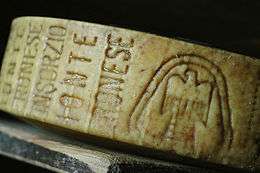Monte Veronese
| Monte Veronese | |
|---|---|
 | |
| Country of origin | Italy |
| Town | Verona |
| Source of milk | Cows |
| Pasteurized | no |
| Texture | semi-hard |
| Fat content |
FDM 44% (intero) 30% (d'allevo) |
| Dimensions |
cylindrical, with almost flat faces and slightly convex sides
|
| Weight |
7-10 kg (intero) 6-9 kg (d'allevo) |
| Aging time |
25-60 days (intero) more than two months (d'allevo) up to 24 months (Stravecchio) |
|
| |
Monte Veronese is an Italian cheese made from cow’s milk which is produced in the northern part of the Province of Verona, more specifically in the Lessini mountains or the Veronese prealps. Like Asiago it comes in two varieties, one fresh and one matured.
Monte Veronese was awarded Italian Denominazione di Origine status in 1993[1] and European Protected designation of origin (Italian: DOP) status in 1996.[2]
Varieties
Monte Veronese latte intero
The fresh Monte Veronese is made from unpasteurized whole milk (latte intero in Italian) and has a brief aging period, from a minimum of 25 days to two months. The paste is white or slightly yellowish in color, with fine and uniformly distributed eyes, and has a sweet, intense flavor.[1]
Monte Veronese d’allevo
The hard paste Monte Veronese is made from unpasteurized semi-skimmed milk. Aging lasts from more than 60 days for wheels to be consumed as table cheese to six months for grating cheese. The paste is white or slightly yellowish in color but with larger eyes than the whole milk variety. Ripening makes the cheese fragrant and slightly piquant.[1]
References
- 1 2 3 "Decreto del Presidente del Consiglio dei Ministri 9 aprile 1993, Riconoscimento della denominazione di origine del formaggio "Monte Veronese"" [Decree of the President of the Council of Ministers of April 9, 1993, Recognition of the Denomination of Origin for "Monte Veronese" cheese]. Gazzetta Ufficiale della Repubblica Italiana (Official Journal of the Italian Republic) (in Italian). Retrieved July 12, 2014.
- ↑ "Commission Regulation (EC) No 1263/96 of 1 July 1996 supplementing the Annex to Regulation (EC) No 1107/96 on the registration of geographical indications and designations of origin under the procedure laid down in Article 17 of Regulation (EEC) No 2081/92". Electronic Official Journal of the EU. Retrieved July 12, 2014.